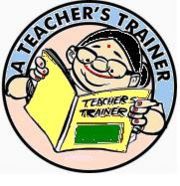ROLE EXPECTATIONS FROM A TRAINER
ROLE EXPECTATIONS OF A TRAINER
ತರಬೇತುದಾರರ ಕಾರ್ಯ ನಿರೀಕ್ಷೆಗಳು ತರಬೇತಿ ನೀಡುವ ಕ್ಷೇತ್ರವು ಎಷ್ಟು ಮುಖ್ಯವೋ ತರಬೇತುದಾರರ ಪ್ರಸ್ತುತಿಯೂ ಅಷ್ಟೇ ಮುಖ್ಯ. ಅವರ ಪ್ರಸ್ತುತಿಯೇ ತರಬೇತಿಯಲ್ಲಿ ಭಾಗವಹಿಸುವವರ ಧೋರಣೆಗಳನ್ನು ರೂಪಿಸುತ್ತದೆ. ತರಬೇತುದಾರರಾಗಿ ನಮ್ಮ ಧೋರಣೆಗಳೇ ಋಣಾತ್ಮಕವಾಗಿದ್ದರೆ ಎಷ್ಟು ಒಳ್ಳೆಯ ವಿಷಯವನ್ನು ಚರ್ಚಿಸಿದರೂ ಪ್ರಯೋಜನವಾಗಲಾರದು. ಅಂತೆಯೇ ಸಕಾರಾತ್ಮಕ ಮನೋಧೋರಣೆಗಳುಳ್ಳ ತರಬೇತುದಾರರು ಎಂತಹ ವಿಷಯವನ್ನಾದರೂ ಭಾಗವಹಿಸುವವರ ಮನಮುಟ್ಟುವಂತೆ ಹೇಳಬಲ್ಲರು. ತರಬೇತಿಯು ಅನುಭವಾತ್ಮಕವಾಗಿದ್ದರೆ ಸಂವಹನವು ಇನ್ನೂ ಉತ್ತಮವಾಗಿರುತ್ತದೆ. ಒಟ್ಟಾರೆಯಾಗಿ ತರಬೇತುದಾರರ ಕಾರ್ಯ ನಿರೀಕ್ಷೆಗಳನ್ನು ಈ ರೀತಿಯಾಗಿ ಗುರುತಿಸಬಹುದು.
- ತರಬೇತಿ ನೀಡಬೇಕಾದ ವಿಷಯಗಳ ಕುರಿತಂತೆ ಪರಿಣಿತಿ ಹೊಂದಿರುವುದು
- ವಿವಿಧ ಅವಧಿಗಳ ಕುರಿತಂತೆ ಸಮರ್ಪಕ ಯೋಜನೆ ತಯಾರಿಸಿಟ್ಟುಕೊಳ್ಳುವುದು
- ವಿಷಯ ಪ್ರಸ್ತುತಿ ಮಾಡುವ ವಿಧಾನಗಳನ್ನು ಅಂತಿಮೀಕರಿಸಿಕೊಂಡು ಅದಕ್ಕೆ ಬೇಕಾದ ತಯಾರಿ ಮಾಡಿಕೊಳ್ಳುವುದು
- ಇತರ ತರಬೇತುದಾರರೊಡನೆ ಸಮನ್ವಯ ಸಾಧಿಸಿಕೊಳ್ಳುವುದು
- ತರಬೇತಿಯ ಸಂಘಟಕರೊಡನೆ ಮೊದಲೇ ಮಾತನಾಡಿ ತರಬೇತಿ ಸ್ಥಳದಲ್ಲಿ ಬೇಕಾದ ಅನುಕೂಲತೆಗಳ ಕುರಿತಂತೆ ಅವರಿಗೆ ಮಾಹಿತಿ ನೀಡುವುದು.
- ವಿದ್ಯುನ್ಮಾನ ಮಾಧ್ಯಮಗಳ ಬಳಕೆಗೆ ಬೇಕಾದ ತಯಾರಿ ಮಾಡಿಕೊಳ್ಳುವುದು - ಪಿ ಪಿ ಟಿ ಅಥವಾ ವೀಡಿಯೋಗಳು
- ಭಾಗವಹಿಸುವವರೊಡನೆ ಆತ್ಮೀಯತೆಯನ್ನು ಸಾಧಿಸಿಕೊಳ್ಳುವುದು
- ಭಾಗವಹಿಸುವವರು ಎದುರಿಸುವ ಸಮಸ್ಯೆಗಳನ್ನು ಸಹಾನುಭೂತಿಯಿಂದ ಪರಿಶೀಲಿಸಿ ಪರಿಹರಿಸಲು ಪ್ರಯತ್ನಿಸುವುದು
- ಶೈಕ್ಷಣಿಕ ಚರ್ಚೆಗಳನ್ನು ನಡೆಸುವಾಗ ಏಕಪಕ್ಷೀಯವಾಗಿ ತೀರ್ಮಾನಕ್ಕೆ ಬರದಿರುವುದು ಅಥವಾ ತೀರ್ಪುಗಳನ್ನು ನೀಡದಿರುವುದು
- ತಮಗೆ ಗೊತ್ತಿಲ್ಲದ ವಿಷಯಗಳ ಕುರಿತಂತೆ ಅನಗತ್ಯವಾಗಿ ಚರ್ಚೆ ಬೆಳೆಸದೆ ಅಗತ್ಯ ಆಕರಗಳನ್ನು ಪರಾಮರ್ಶಿಸಿದ ಮೇಲೆ ಆ ಕುರಿತು ತಿಳಿಸುವುದು.
- ಯೋಜಿಸಿಕೊಂಡಂತೆಯೇ ವಿಷಯ ಪ್ರಸ್ತುತಿ ಮಾಡುವುದು. ಅನಗತ್ಯ ಚರ್ಚೆಗಳಿಗಿಳಿಯದೆ ನಿಗದಿತ ಸಮಯದಲ್ಲಿ ಎಲ್ಲ ವಿಷಯಗಳನ್ನೂ ಪ್ರಸ್ತುತಿಪಡಿಸುವುದು.
- ಒತ್ತಡಕ್ಕೊಳಗಾಗದೇ, ಸಿಡುಕದೇ ಉಲ್ಲಸಿತರಾಗಿ ತರಬೇತಿಯನ್ನು ನಿರ್ವಹಿಸುವುದು
- ಅಂತಿಮವಾಗಿ ಇಡೀ ಚರ್ಚೆಯ ಸಾರಾಂಶವನ್ನು ಎಲ್ಲರ ಗಮನಕ್ಕೆ ತಂದು ಅವಧಿಯನ್ನು ಕೊನೆಗೊಳಿಸುವುದು
ಈ ಅಂಶಗಳಿಗೆ ನೀವು ನಿಮ್ಮ ಅನುಭವದಿಂದ ಕಂಡುಕೊಂಡ ಅಂಶಗಳನ್ನೂ ಸೇರಿಸಿಕೊಳ್ಳಬಹುದು. ಅಂತಿಮವಾಗಿ ನಾವು ನಮ್ಮ ನಮ್ಮ ಅನುಭವಗಳಿಂದ ಒಂದು ತರಬೇತಿಯನ್ನು ಯಾವ ರೀತಿ ಸಂಘಟಿಸಿದರೆ ಯಶಸ್ಸು ಪಡೆಯಬಹುದು ಎನ್ನುವುದನ್ನು ಅರ್ಥಮಾಡಿಕೊಳ್ಳಬೇಕಾಗುತ್ತದೆ. ತರಬೇತಿಯ ಸ್ಥಳ, ಸಂಘಟಕರು, ಭಾಗವಹಿಸುವವರು, ಲಭ್ಯ ಸಂಪನ್ಮೂಲಗಳನ್ನು ಹೊಂದಿಕೊಂಡು ನಮ್ಮ ಕಾರ್ಯ ನಿರೀಕ್ಷೆಗಳೂ ಬದಲಾಗಬಹುದು. ಪ್ರತಿ ತರಬೇತುದಾರರೂ ಈ ರೀತಿಯ ಅನಿರೀಕ್ಷಿತ ಬದಲಾವಣೆಗಳನ್ನು ನಿರೀಕ್ಷಿಸಿ ಅದನ್ನು ಎದುರಿಸಲೂ ಸಜ್ಜಾಗಬೇಕು.
Objective
After studying this section you will
- Become aware of the various roles a teacher educator has to play.
- Come to know of the different characteristics of a good teacher educator.
- Come to know the competencies required.
- Understand to manage differnet roles
- Analyze these characteristics/skills in terms of their implications for the training programme.
IMPORTANCE OF TRAINER SKILLS
The success of a training programme depends on
- The abilities of the trainer.
- His/Her understanding of the roles of a trainer
- The insights she/he has about the purposes of training.
- The nature and composition of the group.
- The mastery over the content to be transacted.
- Communication skills.
- Support system avilable.
- Material and human resources acessable.
In this section we will discuss all the above in detail and see how these characteristics can be enhanced to become effective trainers.
ROLES OF THE TRAINER
As Suzy Siddons says..... A trainer must be a super-effective multi-tasker with eyes in the back and sides of the head.
The trainer’s role is that of a ‘facilitator’ that is, the trainer should help learning to take place. This can happen if the trainer can create an atmosphere and environment that encourages the learning process to take place.
With regard to the content, the trainer should be able to
- Organize and present information in such a way that trainees can use it to increase their knowledge base.
- Organize and present activities that will reinforce the learning process.
- Check to see if learning has taken place.
The Functions of a Facilitator as Identified by Several Trainers are that of:
Social Secretary
Here, the trainer encourages groups to work together and see that all trainees participate in the training. Like any secretary, the trainer has to take care of arrangement materials and programme of work.
Person with a knowledge base and a source of expertise
The trainer’s depth of knowledge in the area is important, for she/he will be the source of information on a training programme. Further the trainer should have expertise enough to act as adviser to participants on issues and problems they may want to bring up. A note of caution here : don’t pretend to be an ‘expert’ – you may lose credibility with the group! Saying ‘I don’t know let me find out’ might be better than giving an unsatisfactory or wrong answer.
Motivator, Encourager and Inspirer
It lies with the trainer to generate enthusiasm on the course. An indifferent trainer can very quickly demotivates the group, while, a committed trainer can make a substantial difference to the quality of involvement of the trainers on the course.
Presenter
On a training programme, the skills of presentation invariably find a place. The trainer himself/herself should have a high degree of presentation skills to be credible.
AREAS COVERED IN THE INDUCTION PACKAGE
The five main qualities of a good presenter are
- Calm confidence that come when one knows what one is doing.
- Ability to guide the course forward confidently.
- Ability to resolve problems.
- Clarity of expression
- Ability to ‘think on one’s feet’
All these qualities are demonstrated in the way the trainer presents the information and handles the training class. A good presentation has for its foundation clear, compelling and logical delivery, effective visual aids and question handling skills.
Quality Controller and Disciplinarian
A trainer must keep discipline – not the ‘fingers on your lips’ variety, but discipline in terms of course time, delivery of materials, giving feedback and not taking it easy. The quality of a training course depends to a large extent on the trainer. Rigorous quality control must be maintained in the type of materials presented, work produced and presentations made. Sloppy thinking, careless task setting and poor time keeping are sure to bring down the quality of the course.
Chairperson
In an interactive training session, the trainer has to often act as a chairperson drawing everyone out, summarizing what has been said, keeping to the agenda and the time allocation.
Mediator, Referee and Peacekeeper
Training programmes that encourage interaction are good, but interaction can lead to heated discussions, arguments or even quarrels. Here, the trainer has to step in as mediator, referee and peacekeeper. She/he needs skills to the de-fuse the conflict, get the interaction back on the track and above all keep his/her head when all others are losing their. We have, till now, talked about qualities a trainer should possess to become a good facilitator. There are a few roles the trainer SHOULD NOT take on if he/she wants to become a good facilitator.
A Democrat
Trainers, if they are not careful, can start feeling like a god; indispensable to the trainees and to the course. They might even feel that they are the ultimate and unquestionable source of all information.
This attitude is dangerous, because instead of making trainees autonomous learners/trainers, it makes them dependent learners/trainees. Though this relationship may be flattering to the trainer, it is contrary to the basic aim of the training programme, which aims at making trainees independent functionaries in the system.
An Elicitor
Lectures, lectures and more lectures–very often a training programme is nothing but this, the trainer, in such a situation reveals that she/he is of the opinion that the lecture method is the only way of conveying information. Without devaluing the lecture in any way as a mode of training, it has to be admitted that there are very many other modes of training that encourage information transfer in an interactive and eliciting way. More over, the trainee teachers have a fund of knowledge and experience to draw from.
But Not a Nursery School Teacher'
Trainees are not young learners who need to be controlled and told what to do. The trainer might have more expertise, but this does not mean that she/he should talk down to the trainees. Such an attitude is not conducive to a good learning atmosphere.
| Send the Completed Activity Sheet to:
dakshayinisadpi@gmail.com |
|
Trainer Vs Non-Trainer Perceptions
First, in comparing the perceptions of the trainers themselves (whether through introspection or elicitation) with the observations of the non-trainers, we notice a high degree of similarity. The clarity with which the participants identify the activities of the tutor-trainer, does suggest that awareness of the trainer’s role is indeed built up through first hand observation of trainers at work. This in turn under lines the belief:
“The approach to teaching being put over by the institution ought somehow to be experienced as reality by the trainees.” (Wallace 91).
The concept of the trainer as the introducer of the new ideas is still perhaps unsurprisingly the most commonly mentioned role, for both trainers and non-trainers, although the newer roles of trainer as
“observer”
and “listener” appear also to have struck many teachers. Aspects of the trainer’s role as organizer and determiner of classroom experience are mentioned frequently by both groups, indicative perhaps of the profession’s increasing interest in management skills.
We can also learn something from the points on which trainers and non-trainers differ. The role of the trainer as evaluator, frequently mentioned by the teachers is something that the trainers do not focus on. The reluctance of trainers to accept at times a dual role of assessor and advisor is borne out by this admonition (Walace 91).
“Far from being “a necessary evil”, assessment can play a positive role in a teacher education course, for example, by integrating different areas of the course and by developing the trainees’ powers of analysis and reflection.”
His point is echoed by the positive roles of trainer-as-evaluator listed by participants themselves in the second part of the survey. Evaluation was stated for example to “enable participants to evaluate their own progress” or allow the trainer to “adapt the course to the needs of the trainee”.
The Categorization of Trainer Roles
Following Wright (1987) the data was analyzed into inter-personal and task-related roles. Different levels of inter-personal roles were clearly shown. The trainer is at once:
| An equal | A collaborator with his/her colleagues a member of a team |
| In a position of power | Gives trainees moral support, gives professional advice, is a counsellor, monitors what goes on around him/her |
| Under obligations | Is available inside and outside the classroom, learns from trainees, is a spokesperson |
Task-Related Roles
For clearer focus, these were classified into organization, PRESET (pre-service or initial teacher training) or INSET (In-service teacher training) focussed, content-related, technical, task-oriented and evaluator roles, the diagram below suggests one way of illustrating trainer roles perceived in task-related training : the assumption of each set of roles providing the context for the next.
Involving both tutors and trainees in such an enquiry into the roles of the trainer raised unconscious knowledge to conscious awareness. Carrying out the survey, introduced the participants to a methodology they could themselves apply in their own teaching or training programmes.
| Send the Completed Activity Sheet to:
dakshayinisadpi@gmail.com |
|
|
Given below are some ‘role definitions’ and a list of Trainer’s functions. Think about the ‘definitions’ and functions for 3 Mts. and match the definitionwith their appropriate functions. Identify more than one function for a role. Remember, for some ‘roles’ you may not find any function to match. Roles of a Trainer
Functions
|
|
If a trainer were to follow the following guidelines, think what would you find and what behaviours you would not find in him/her during the training programme.
|
For further information about visual communication you may check the following web resources
|






